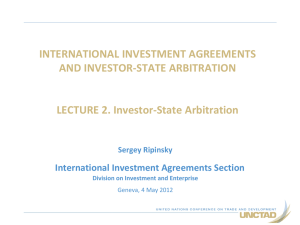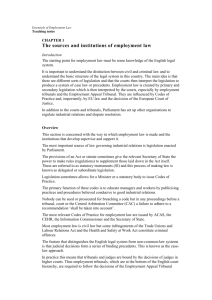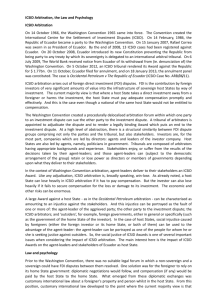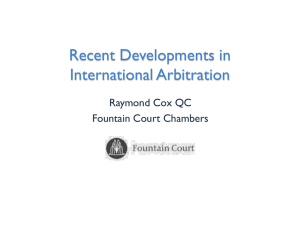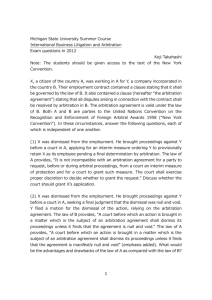Costs in Investment Treaty Arbitration
advertisement
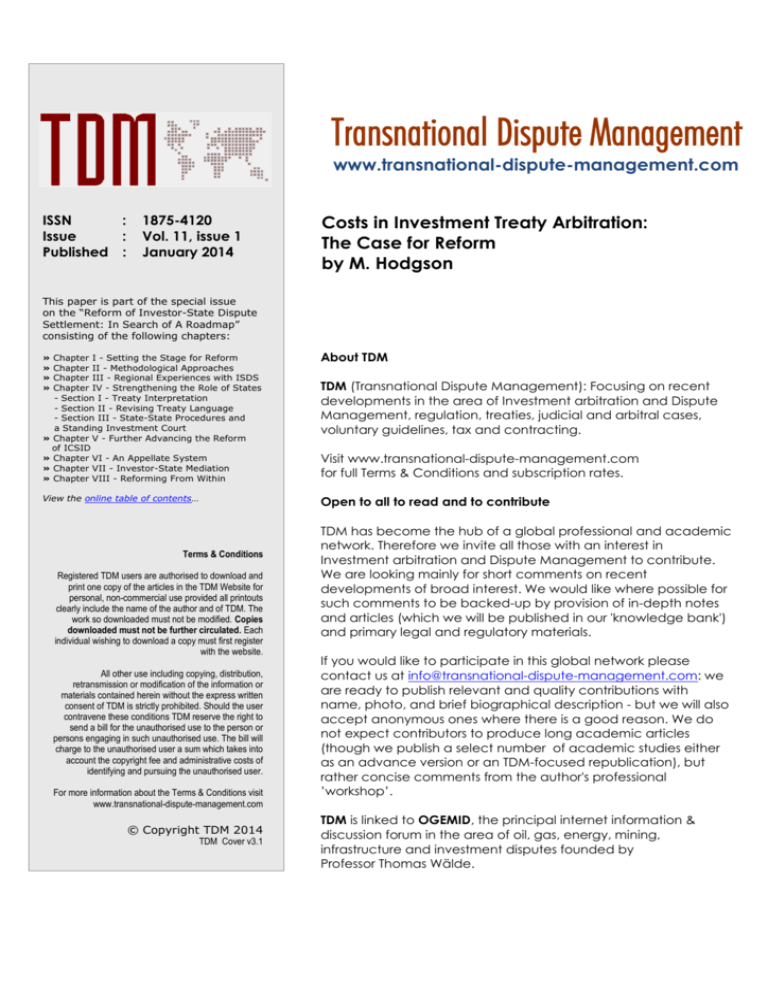
Transnational Dispute Management www.transnational-dispute-management.com ISSN : Issue : Published : 1875-4120 Vol. 11, issue 1 January 2014 Costs in Investment Treaty Arbitration: The Case for Reform by M. Hodgson This paper is part of the special issue on the “Reform of Investor-State Dispute Settlement: In Search of A Roadmap” consisting of the following chapters: Chapter I - Setting the Stage for Reform Chapter II - Methodological Approaches Chapter III - Regional Experiences with ISDS Chapter IV - Strengthening the Role of States - Section I - Treaty Interpretation - Section II - Revising Treaty Language - Section III - State-State Procedures and a Standing Investment Court » Chapter V - Further Advancing the Reform of ICSID » Chapter VI - An Appellate System » Chapter VII - Investor-State Mediation » Chapter VIII - Reforming From Within About TDM View the online table of contents… Open to all to read and to contribute » » » » Terms & Conditions Registered TDM users are authorised to download and print one copy of the articles in the TDM Website for personal, non-commercial use provided all printouts clearly include the name of the author and of TDM. The work so downloaded must not be modified. Copies downloaded must not be further circulated. Each individual wishing to download a copy must first register with the website. All other use including copying, distribution, retransmission or modification of the information or materials contained herein without the express written consent of TDM is strictly prohibited. Should the user contravene these conditions TDM reserve the right to send a bill for the unauthorised use to the person or persons engaging in such unauthorised use. The bill will charge to the unauthorised user a sum which takes into account the copyright fee and administrative costs of identifying and pursuing the unauthorised user. For more information about the Terms & Conditions visit www.transnational-dispute-management.com © Copyright TDM 2014 TDM Cover v3.1 TDM (Transnational Dispute Management): Focusing on recent developments in the area of Investment arbitration and Dispute Management, regulation, treaties, judicial and arbitral cases, voluntary guidelines, tax and contracting. Visit www.transnational-dispute-management.com for full Terms & Conditions and subscription rates. TDM has become the hub of a global professional and academic network. Therefore we invite all those with an interest in Investment arbitration and Dispute Management to contribute. We are looking mainly for short comments on recent developments of broad interest. We would like where possible for such comments to be backed-up by provision of in-depth notes and articles (which we will be published in our 'knowledge bank') and primary legal and regulatory materials. If you would like to participate in this global network please contact us at info@transnational-dispute-management.com: we are ready to publish relevant and quality contributions with name, photo, and brief biographical description - but we will also accept anonymous ones where there is a good reason. We do not expect contributors to produce long academic articles (though we publish a select number of academic studies either as an advance version or an TDM-focused republication), but rather concise comments from the author's professional ’workshop’. TDM is linked to OGEMID, the principal internet information & discussion forum in the area of oil, gas, energy, mining, infrastructure and investment disputes founded by Professor Thomas Wälde. Costs in Investment Treaty Arbitration: The Case for Reform Matthew Hodgson, Allen & Overy LLP* The purpose of investment treaties is to promote economic development by providing substantive protections for investors in respect of their investments in foreign jurisdictions. The role of investment treaty arbitration is to provide a meaningful remedy for investors in the event that those protections are breached. The remedy sought by investors is almost invariably monetary compensation with a view to restoring them to the financial position that would have pertained if there had been no breach. Investment treaties are therefore first and foremost a matter of economics. The decision as to whether to commence an arbitration claim is effectively a further investment decision based on an assessment of the relative risks and rewards. The costs of the investment arbitration process and how these costs are ultimately allocated between the disputing parties is therefore a matter of considerable importance. Moreover, the costs of investment treaty arbitration are significant. A recent study by the author of public awards and decisions provides empirical data in this regard.1 This data is considered below. However, when it comes to the allocation of costs, the practice and reasoning of tribunals is diverse and often incoherent. This inconsistency is increased by different approaches taken in the UNCITRAL and ICSID Rules. This article draws upon this study to consider costs in practice and the current approach of arbitration tribunals to allocation of costs. It makes a case for reform of investment arbitration practice, arguing for the establishment of a default position in the interests of fairness and predictability and further argues that the default approach should be “costs follow the event” (CFTE) or “loser pays”. Finally, it will suggest how reform may be achieved in practice. COSTS IN PRACTICE The costs of an arbitration tribunal fall into two main categories: (1) the fees and expenses of the arbitral tribunal itself along with any institution or appointing authority (Tribunal Costs); and (2) those of legal counsel as well as any expert or factual witnesses (Party Costs). The average Party Costs for Claimants and Respondents are in the region of USD 4.4 million and USD 4.5 million respectively.2 To this can be added average Tribunal Costs of around USD 750.000. The average * The author would like to acknowledge Sophy Cuss for her help in preparing this article. The views in this article are those of the author only and do not necessarily reflect the views of Allen & Overy LLP. 1 2 The study examined cases with a public award or decision as at 31 December 2012. The results will be published shortly by the Global Arbitration Review (GAR). The underlying data will be published online at www.allenovery.com . For precise results see forthcoming GAR article. 1 “all in” costs of an investment treaty arbitration are therefore just short of USD 10 million.3 The median figure is notably lower, but still substantial, at around USD 6 million.4 Considering that the average amount awarded to successful claimants is around USD 76 million (and the median just USD 10.5 million), costs may represent a substantial part of the financial outcome. Notwithstanding this, costs receive little attention from tribunals, with an average award devoting just six paragraphs to the subject of costs. In exercising its discretion on the apportionment of costs, a tribunal has two main options. It can leave each party to bear its own Party Costs and 50% of the Tribunal Costs (an Unadjusted Costs Order). Or it can order one party to pay the other side’s Party and pro-rata Tribunal Costs, whether in full (Fully Adjusted Costs Order) or in part (Partially Adjusted Costs Order). In a majority (56%) of cases tribunals made an Unadjusted Costs Order. Around one third (34%) of tribunals made a Partially Adjusted Costs Order and just 10% made a Fully Adjusted Costs Order. The aggregated data conceals several interesting discrepancies. First, and consistent with the general 5 perception, there appears to be a trend towards Adjusted Costs Orders: in pre-2006 decisions tribunals adjusted costs in only around one third (35%) of cases. From 2006 onwards, this number has risen to around half of cases (49%). Second, there is a notable divergence between ICSID and UNCITRAL practice. In arbitrations conducted under the UNCITRAL rules, tribunals made an Adjusted Costs Order in more than two thirds of cases (69%) compared with just over one third (36%) of ICSID decisions. REASONING: THE DIFFERENT APPROACHES TO COSTS There are two basic approaches to costs: “pay your own way” on the one hand and CFTE (or “loser pays”) on the other. Each approach finds considerable support in case law. The “pay your own way” approach is the traditional position in inter-State disputes under international law, as reflected in the Statue of the International Court of Justice (as well as its predecessor the PCIJ).6 It is also the usual position in litigation in the US, China and Japan. The justification for the former has generally 3 4 5 6 This figure is arrived at by adding the overall average figures for Claimant (data available in 73 cases), Respondent (66 cases) and Tribunal costs (70 cases). Full costs data (i.e. each of these three elements) was provided in very few cases, so using the overall data provided the best, albeit imperfect, approximation of average costs in each arbitration. Comprising approximately USD 3.1 million (Claimant Legal Costs), USD 2.3 million (Respondent Legal Costs) and USD 600,000 (Tribunal Costs). See for example, LG&E Energy Corp, LG&E Capital Corp and LG&E International Inc v. Argentine Republic ICSID Case No. ARB/02/1, Award dated 25 July 2007, paragraph 112: “The Tribunal notes that Article 61(2) of the ICSID Convention and Rule 28 of the ICSID Arbitration Rules grant discretion to ICSID tribunals with regard to the award of costs. The Tribunal further notes that there is no uniform practice in treaty arbitration with regard to this matter. However, recently, tribunals have made recourse to the basic principle “costs follow the event” or “loser-pays-rule” according to which the cost of the arbitration should be borne by the unsuccessful party. [Citing International Thunderbird Gaming, Methanex, CSOB] The outcome of the case becomes the most significant factor in determining the allocation of costs.” Statute of the International Court of Justice, 24 October 1945, Article 64: “Unless otherwise decided by the Court, each party shall bear its own costs”, accessible at http://www.icj-cij.org/documents/index.php?p1=4&p2=2&p3=0 and Statute of the Permanent Court of International Justice, September 1921, Article 64, accessible at http://www.worldcourts.com/pcij/eng/documents/1920.12.16_statute.htm#_Toc160729764 . 2 been as a matter of international comity and to avoid aggravating strained relations between States since an adverse costs order may be viewed as to some degree punitive. The US approach is often justified on the basis that each party’s legal costs are properly considered a “cost of doing business” for which they alone should be responsible and that to shift costs may discourage the attempt to enforce legal rights. In the investment arbitration context examples of this approach have been seen, for example, in the decisions in L.E.S.I. v. Algeria7 and Anderson v Costa Rica.8 This approach was also accepted as the appropriate approach in Romak v. Uzbekistan, notwithstanding that the claim was governed by the 1976 UNCITRAL rules which include a default CFTE rule for Tribunal Costs. The tribunal referred to broader investment treaty case law favouring a “pay your own way approach” and explained that due to the “novel mechanism and substantive law” involved in investment claims the “initiation of a claim that is ultimately unsuccessful is more understandable than would be the case in commercial arbitration, where municipal law applies”.9 The opposite approach is CFTE or “loser pays”. It is usual for the loser to pay at least some portion of the winner’s costs before the national courts in many jurisdictions including England & Wales, France, Germany, Hong Kong, Italy, the Netherlands, Poland, Russia, Singapore, Spain and Thailand. This is also the prevalent approach in international commercial arbitration.10 The underlying philosophy is that a party whose position is vindicated ought to be compensated for the costs of advancing such position, or else it will have suffered a loss caused by the party whose position was flawed. This approach is also justified on the grounds that it encourages a reasonable approach to settlement. It is therefore an important corollary that the default CFTE rule may be displaced if the respondent has made a reasonable offer to settle. This is formalised in the institution of “Part 36 Offers” under the Civil Procedure Rules in England & Wales, whereby a claimant which does not accept a settlement offer and fails to better this (i.e. obtains judgment for an amount equal to or less than the offer) will normally be required to pay the costs of the defendant subsequent to the offer.11 In the investment tribunal context, the CFTE approach has been followed in cases such as ADC v. Hungary12 and Gemplus v. Mexico.13 A variant on the CFTE approach seeks to allocate costs in proportion to the outcome of the case, taking into consideration the relative success of various claims and defences, and taking account of factors such as the amount claimed versus the amount actually awarded. This approach aims to encourage reasonable conduct in the proceeding. This approach has gained traction in investment arbitrations in recent years and has been 7 8 9 10 11 12 13 L.E.S.I. S.p.A. and ASTALDI S.p.A. v. République Algérienne Démocratique et Populaire, ICSID Case No. ARB/05/3, Award, 12 November 2008, para. 186. Alasdair Ross Anderson et al v. Republic of Costa Rica, ICSID Case No. ARB(AF)/07/3, Award, 19 May 2010, paras. 62-64. Romak S.A v . The Republic of Uzbekistan, UNCITRAL, PCA Case No. AA280, Award 26 November 2009 para. 250. School of International Arbitration at Queen Mary, University of London, Current and Prefereed Practices in the Arbitral Process, Survey of 1 October 2012. Civil Procedure Rules 36.14. Available at http://www.justice.gov.uk/courts/procedure-rules/civil/rules/. ADC Affiliate Limited and ADC & ADMC Management Limited v. The Republic of Hungary, ICSID Case No. ARB/03/16 Award dated 2 October 2006 at paras 531-533. Gemplus S.A., SLP S.A., Gemplus Industrial S.A. de C.V. v. The United Mexican States, ICSID Case No. ARB(AF)/04/3 Award dated 16 June 2010 at para. 17-22. 3 followed by tribunals in cases such as EDF v Romania,14 Occidental v Ecuador,15 and Helnan v Egypt.16 Indeed, the majority award in International Thunderbird v. Mexico, whilst often cited as favouring a CFTE approach in investment arbitration, in fact ultimately endorsed the “relative success” approach.17 As will be seen below, “relative success” of the parties on different issues in dispute has been referred to in almost half of decisions on costs. Whilst this approach is superficially appealing, it has two major defects. The first is practical. Whilst it is a straight forward matter to identify the key issues in dispute and the actual outcome on these, it is much more difficult to translate this into practical consequences in terms of costs. For example, consider a fairly typical claim where an investor seeks USD 100 million for breach of fair and equitable treatment, non-expropriation and full protection and security clauses. Suppose the investor succeeds and is ultimately awarded USD 40 million for breach of FET. All other claims are dismissed. What proportion of the claimant’s costs should be recovered? On the basis that it has failed in the majority of its claims and recovered less than half of the damages sought, should it be less than 50%? Or should the tribunal try to estimate how much time was spent by counsel and the tribunal on the failed claims? The latter task may prove very difficult, if not impossible, not least because the facts will typically overlap between different claims and costs schedules prepared by the parties will rarely identify costs by issue. In many cases, tribunals use the relative success of each party on some issues but not on others as a justification for an Unadjusted Costs Order even though it is far from obvious that the issues were roughly equal in terms of their contribution to the costs of the proceeding. Further, it is far from clear that the application of this approach is fair. Is it right that the successful party should have its costs recovery reduced because during the course of a successful claim or defence, it has also raised arguments which were unsuccessful? Whereas the “loser pays” approach essentially suggests that a party should assess whether on the whole its claim or defence is sound and proceed accordingly or else accept the consequences in costs, this approach goes further and suggests that a party should conduct the same exercise for each and every issue in dispute – effectively trying to pre-empt the tribunal’s decision on each point. That seems unrealistic. Suppose a respondent State has a credible jurisdictional defence (with say a 30-40% chance of success) and a strong case on the merits. It would be very unusual for the State not to raise the jurisdictional defence in such circumstances. Assuming the claims are dismissed on the merits, is it fair to require the State to bear the costs of its failed jurisdictional defence? Should it not rather be for the investor which has forced the State to incur costs in defending a meritless claim to bear all reasonable costs involved in defending such claims, including the costs of all reasonable, even if ultimately unsuccessful, arguments? It is a different matter, of course, if the successful party has also raised weak or 14 15 16 17 EDF (Services) Limited v. Romania, ICSID Case No. ARB/05/13, Award, 8 October 2009, paras. 327-329. Occidental Petroleum Corporation and Occidental Exploration and Production Company v. The Republic of Ecuador, ICSID Case No. ARB/06/11, Award, 5 October 2012, paras. 873-874. Helnan International Hotels A/S v. Arab Republic of Egypt, ICSID Case No. ARB/05/19, Award, 3 July 2008, paras. 173-174. International Thunderbird Gaming Corporation v. The United Mexican States, UNCITRAL, Award 26 January 2006, see para. 220 “Mexico did not however prevail on all issues. In consideration of this fact, the Tribunal shall exercise its discretion and allocate the costs on a ¾-¼ basis.” 4 spurious arguments during the proceeding. A tribunal adopting the “loser pays” approach is free to punish such wasteful conduct. Surely the important question is not whether every substantive argument or procedural application by the winning party was ultimately successful but whether it was reasonably made. Indeed, it is important to be clear that the principle adopted by the tribunal does not necessarily dictate the actual outcome on costs. The principles merely provide a starting point and the tribunal always retains discretion to deviate from the default position in appropriate circumstances. For example, a tribunal might adopt the CFTE approach but decide to make an Unadjusted Costs Order because of, for example, misconduct during the arbitral process by the successful party. It does not therefore necessarily follow that the pervasiveness of the Unadjusted Costs Order in investment arbitration decisions means that most tribunals reject the loser-pays principle. It is necessary to consider the reasoning of each tribunal more closely. In one third (33%) of cases, the tribunal appeared to adopt CFTE as the starting point. Perhaps unsurprisingly, almost half (15%) of these cases were conducted under the UNCITRAL Rules which provide a default CFTE position.18 In just 6% of cases, the tribunal expressly adopted “pay your own way” as the starting point. However, in the majority of cases (61%), the tribunal did not establish a clear starting point for its reasoning although in many of these cases the “relative success” on different issues of each party was referred to inter alia in explaining the ultimate decision. In a number of ICSID cases where the tribunal made an Unadjusted Costs Order, no reasoning at all was provided for this decision.19 Whether adopting CFTE or “pay your own way” as a starting point, the tribunal justified the actual outcome by reference to relative success or failure of the parties in almost half (45%) of cases, by far the most frequent justification followed by “bad behaviour” (21%) of one of the parties. Also referred to were factors such as the good behaviour of the losing party (15%) and the complexity or, at least, arguability of certain claims (15%). Other factors cited (albeit much less frequently) included settlement efforts and public interest. Where the tribunal adopted CFTE as the starting point, it nonetheless went on to make an Unadjusted Costs Order in one quarter of those cases, including by reference to the factors above which justified deviating from the default position. 18 19 Article 42.1 of the 2010 UNCITRAL Rules states "[t]he costs of the arbitration shall in principle be borne by the unsuccessful party or parties" subject to the proviso that "the arbitral tribunal may apportion each of such costs between the parties if it determines that apportionment is reasonable, taking into account the circumstances of the case". The 1976 Rules contain a similar, albeit more limited, Article 40.1 which applies only to Tribunal Costs and a separate Article 40.2 which expressly gave the tribunal discretion as to the Party Costs. Empresa Lucchetti S.A. and Lucchetti Peru, S.A. v. Republic of Peru ICSID Case No. ARB/03/4 Award dated 7 February 2005 at p.25; ; TSA Spectrum de Argentina S.A. v. Argentine Republic (ICSID Case No. ARB/07/12) Award at para 180 stating simply “the Tribunal finds the circumstances to be such that each party shall bear its own expenses… and that the fees and expenses of the members of the Tribunal shall be shared equally by them”; CMS Gas Transmission Company v. The Argentine Republic (ICSID Case No.ARB/01/8) Award 12 May 2005 at para. 472; Joy Mining Machinery Limited v. Egypt ICSID Case No. ARB/03/11 Award dated 6 August 2004, p.25; Mihaly International Corporation v. Sri Lanka ICSID Case. No. ARB/00/2 Award dated 15 March 2002 para. 62; Sempra Energy International v. Argentine Republic ICSID Case No.ARB/02/16, Award dated 28 September 2007, p.139. 5 THE CASE FOR REFORM The case for a default position in the ICSID Rules The case for greater consistency and predictability in the area of costs is not difficult to make. It is clearly preferable that parties contemplating or responding to proceedings should be able to assess at the outset the likely consequences in terms of costs. This enables claimant investors to make a properly informed decision as to whether to commence a claim and respondents to consider an appropriate settlement offer. It has been seen above that the costs of investment treaty arbitration proceedings are substantial. Whether and how they are adjusted is therefore an issue of considerable importance. The ICSID Rules are now an outlier insofar as they set out neither a default position nor even an indication of relevant factors to be taken into account by tribunals in exercising their discretion as regards costs.20 Recent amendments reflected in Article 42.1 of the 2010 UNCITRAL Rules have extended the presumption of CFTE to both Tribunal and Party Costs (Article 40.1 of the 1976 Rules had covered only Tribunal Costs, with Party Costs left to the Tribunal’s discretion under Article 40.2). The inconsistent approach of ICSID awards to the subject of costs should therefore not come as a surprise. Some ICSID tribunals have referred to a “general rule that an unsuccessful litigant in international arbitration should bear the reasonable costs of its opponent”.21 Others have asserted the opposite point of view that “the practice of arbitral tribunals is to share the costs between the parties”.22 Many others have indicated no starting point at all. The divergent approaches make it virtually impossible for parties to predict the outcome as regards costs in an ICSID claim. The stark divide between approaches taken by ICSID and UNCITRAL tribunals is unsatisfactory. Many investment treaties offer access to both sets of arbitral rules; it is strange that the choice of rules should lead to an entirely different approach to the allocation of costs of the proceeding. As it stands, claimants with strong claims might prefer to proceed under the UNCITRAL rules in order to maximise their prospects of cost recovery. A further inconsistency is found in the approach of tribunals to the adjustment of costs in favour of successful claimants and respondents. Although claimants tend to succeed (i.e. obtain an award on the merits of monetary value) in a minority (41%) of cases, they are more likely to be awarded costs than 20 21 22 Cf. Article 42; LCIA Arbitration Rules (1998), Article 28(4): “Unless the parties otherwise agree in writing, the Arbitral Tribunal shall make its orders on both arbitration and legal costs on the general principle that costs should reflect the parties' relative success and failure in the award or arbitration, except where it appears to the Arbitral Tribunal that in the particular circumstances this general approach is inappropriate”; ICC Rules of Arbitration, (2012), Article 37(5): “In making decisions as to costs, the arbitral tribunal may take into account such circumstances as it considers relevant, including the extent to which each party has conducted the arbitration in an expeditious and cost-effective manner”; and SCC Arbitration Rules (2010), Articles 43(5) and 44 providing that the tribunal shall decide how to allocate Tribunal and Party Costs “having regard to the outcome of the case and other relevant circumstances”. Generation Ukraine, Inc., v. Ukraine, ICSID Case No. ARB/00/9, Award, 16 September 2003, para. 24.1. See also Champion Trading Company, Ameritrade International, Inc. v. Arab Republic of Egypt, ICSID Case No. ARB/02/9 (formerly Champion Trading Company, Ameritrade International, Inc., James T. Wahba, John B. Wahba, Timothy T. Wahba v. Arab Republic of Egypt), Award, 27 October 2006, para. 176: “[B]asically the costs follow the event”. L.E.S.I. S.p.A. and ASTALDI S.p.A. v. République Algérienne Démocratique et Populaire, ICSID Case No. ARB/05/3, Award, 12 November 2008, para. 186. Unofficial translation. 6 successful respondents. Successful claimants receive an Adjusted Costs Order in a majority (53%) of cases, whereas successful respondents do so in just 38% of cases. The case for CFTE This is far from the first call for greater consistency in the approach of tribunals to the subject of costs.23 More controversial, however, is whether a CFTE or “pay your own way” approach is appropriate in the context of investor-State disputes. It is submitted that a CFTE approach should be preferred. As well as reflecting the general trend of tribunals in recent years towards CFTE, this approach has a number of other advantages. First, it is consistent with the broad aim of damages in international law which is to wipe out the consequences of the unlawful act. Where settlement is not possible and the investor is forced to achieve its remedy for breach of treaty through a costly arbitration process, it will be left substantially out of pocket if it does not also recover its reasonable costs. In Chorzów Factory, the Permanent Court of International Justice famously concluded that “reparation must, as far as possible, wipe out all the consequences of the illegal act and re-establish the situation which would, in all probability, have existed if that act had not been committed”.24 The court did not address cost allocation as between Germany and Poland since each party was responsible for its own costs pursuant to Article 64 of the Statute of the Court. Instead it confined itself to an assessment of the losses of the two German companies whose interests lay behind the claims. The dynamic of modern investor-State arbitration is different. As noted above, the very purpose of investment treaties and arbitration is economic. Moreover, the nature of investor-State arbitration is that the investor itself (and not its State of nationality) commences a claim and incurs the costs of doing so. Several tribunals have correctly referred to Chorzów Factory (or discussed similar principles) in awarding costs to the successful investor. For example, the tribunal in Gemplus S.A. v. Mexico quoted the extract of Chorzów above, and stated that “it is the Tribunal’s view that compensation should include a claimant’s reasonable costs, both reasonably incurred and reasonable in amount, in successfully and necessarily asserting its disputed legal rights in arbitration proceedings against an unsuccessful respondent”.25 Whilst they did not cite Chorzów directly, the tribunals in ADC v. Hungary and SPP v. Egypt followed essentially the same reasoning in stating that it was necessary for the claimant to recover reasonable legal costs in order for it to be “made whole”.26 23 24 25 26 See e.g. S.D. Franck , “Rationalising Costs in Investment Treaty Arbitration” (2011) 88(4) Washington University Law Review 769-852. The Factory at Chorzów (Claim for Indemnity), No. 13, 1928, PCIJ Rep, Series A, No. 17, Merits, 13 September 1928, p.47 (para.125). Gemplus S.A., SLP S.A., Gemplus Industrial S.A. de C.V. v. The United Mexican States, ICSID Case No. ARB(AF)/04/3, Award, 16 June 2010, para. 27. ADC Affiliate Limited and ADC & ADMC Management Limited v. The Republic of Hungary, ICSID Case No. ARB/03/16, Award, 2 October 2006, para. 553 and Southern Pacific Properties (Middle East) Limited v. Arab Republic of Egypt, ICSID Case No. ARB/84/3, 20 May 1992, para. 207. 7 Whilst the reasoning of Chorzów Factory does not obviously apply where the respondent State succeeds, since there is no international unlawful act, there are policy arguments in favour of following the same approach. Defending investment arbitrations can place a significant burden on the budgets of developing States. At the same time, it has been seen that successful States are less likely to recover their costs than successful investors. It is not obvious why a State which succeeds in defending an unmeritorious claim is less deserving of compensation than a successful investor. The CFTE principle may have a further positive effect of discouraging claimants from commencing weak or frivolous claims that are brought as a negotiating tactic. The drafters of the ICSID Convention showed particular concern for this during the drafting of Article 61(2).27 Conversely, the CFTE principle may encourage States with a weak position to take a reasonable approach to settlement discussions. This was recognised by the Tribunal in Libananco: “The present Tribunal is of the view that a rule under which costs follow the event serves the purposes of compensating the successful party for its necessary legal fees and expenses, of discouraging unmeritorious actions and also of providing a disincentive to over-litigation. It also allows a tribunal sufficient leeway to take due account of specific issues on which the overall losing party has nevertheless succeeded, and to take account as well of the costs implications of procedural motions raised by one or another party.”28 Taking the opposite view, it has recently been argued by Vasani and Ugale that the ICSID Convention may be interpreted in order to construe support a default “pay your own way” approach.29 In particular, referring to the preamble of the Convention, they argue that “the ICSID is unique, as it sets an agenda ‘attaching particular importance’ to the ‘availability’ of the arbitration facility to the parties”. They further argue that the effect of a CFTE rule is that investors, particularly small and medium sized investors, may be put off commencing a claim. This reasoning can be criticised in two respects. First, an examination of the drafting history of the ICSID Convention casts serious doubt on the attempt to interpret the Convention as establishing a default rule. The drafting history evidences considerable discussion and disagreement between representatives over the proper approach to costs, which was eventually resolved by conferring broad discretion on tribunals.30 Article 61(2) was originally drafted with a default “pay your own way” approach but with discretion for the tribunal to adjust costs in the event of claims commenced “frivolously” or in “bad faith”.31 In response to proposals from Austria and Brazil for a 27 28 29 30 31 The Working Paper, Preliminary Draft and First Draft of the Convention provided that each party should bear its own costs, each draft included a carve out if the tribunal determined that a party had instituted proceedings “frivolously or in bad faith”. History of the ICSID Convention: Documents Concerning the Origin and the Formulation of the Convention on the Settlement of Investment Disputes between States and Nationals of Other States (hereafter “History of the ICSID Convention”), Analysis of Documents Concerning Formation of the Centre, Volume I, p.274. Libananco Holdings Co. Limited v. Republic of Turkey, ICSID Case No. ARB/06/8, Award, 2 September 2011, para. 563. B. S. Vasani and A. Ugale, “Cost allocation in investment arbitration: Back toward diversification” in K. P. Sauvant and J. Reimer, Perspectives on topical foreign direct investment issues by the Vale Columbia Center on Sustainable International Investment (No. 100, 29 July, 2013). History of the ICSID Convention (1970) Documents Concerning the Origin and Formation of the Centre, Volume II-1 p.351-353. History of the ICSID Convention, Analysis of Documents, Volume 1 (ICSID, 1970), p. 274. 8 CFTE approach, Article 61(2) was eventually adapted to allow the tribunal discretion to take either a CFTE or a “pay your own way” approach.32 Further, it is far from clear that a claimant which considers that it has a strong claim would actually be put off by application of a CFTE rule. The opposite may actually be true, particularly for the small or mediumsized investor, and where the investor’s likely costs represent a significant portion of the value of the claim. Only if the investor expects to recover those costs may the claim be worthwhile. REFORMING COSTS IN PRACTICE Whilst it is relatively common for investment treaties to specify that each party shall bear its own costs in the case of State-State disputes, few treaties provide any guidance as regards cost allocation in investor-State disputes. One method of reform would be for States to include wording in future treaties providing for a default CFTE rule and perhaps amend existing treaties to that effect. Whilst States have an incentive to do so, both in order to discourage frivolous claims and because States are more likely to succeed on the merits than investors but less likely to recover costs, the process is likely to be slow. Further, as seen above, the problem is primarily with ICSID tribunal practice where the rules provide neither a default position nor any guidance for a tribunal’s exercise of discretion. The better solution would therefore be to amend the ICSID arbitration rules in order to establish a default CFTE position. This would require a decision of the Administrative Council, pursuant to Article 6(1) of the ICSID Convention. There is a precedent for this. The 2006 amendments to the ICSID Rules, inter alia, to allow for the submissions of non-disputing parties (Rule 37), were motivated in part by the desire to bring ICSID practice into line with that of UNCITRAL, since two UNCITRAL tribunals had confirmed their authority to accept third party submissions.33 Establishing a default position may encourage tribunals to devote more time and consideration to costs as they would have to give reasons for deviating from default. It is notable that whereas a number of ICSID tribunals have provided no reasons whatsoever for their decision on costs (see above), this is not the case with UNCITRAL tribunals. As an important aspect of the claim, parties are entitled to understand the tribunal’s reasons in relation to costs as they are on the merits. Any amendment to the ICSID arbitration rules should, of course, provide that the tribunal retains discretion to deviate from the default CFTE rule if it considers this appropriate. One reason for doing so would be the conduct of the parties during the proceeding. The express inclusion of such a provision, and indeed greater attention to the subject of costs more generally, may serve to discourage misbehaviour of parties and their counsel during the proceeding. 32 33 History of the ICSID Convention (1970) Documents Concerning the Origin and Formation of the Centre, Volume II-2 p.873. ICSID Secretariat Discussion Paper October 22, 2004; “Possible Improvements of the Framework for ICSID Arbitration”. Available at https://icsid.worldbank.org/. 9
